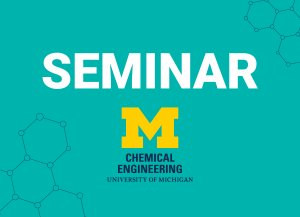Presented By: Chemical Engineering
ChE SEMINAR: “Hope for Higher Ion Velocities in Polymer Electrolytes”
Nitash P. Balsara, University of California, Berkeley

The ChE seminar series features guest speakers. U-M ChE faculty and graduate students are especially encouraged to attend.
Abstract: The need for creating safe electrolytes for lithium batteries is significant given the continued safety problems associated with current lithium-ion batteries. Nonflammable polymer electrolytes, mixtures of polymers and salt, offer a possible solution, but the rate of lithium ion transport is too low for practical applications. In this talk, I will discuss some of the fundamental factors that limit ion transport in polymers. The performance of electrolytes depends on the current of the working ion under an applied electric potential. Since the current is proportional to the product of the concentration and ion velocity, the velocity of the working ion is of paramount importance. We discuss approaches for predicting ion velocities based on Newman’s concentrated solution theory. The importance of the continuity equation in the presence of ionic current is discussed. We test our predictions on a standard polymer electrolyte based on poly(ethylene oxide) (PEO). To obtain a mechanically robust solid electrolyte, we use PEO-containing block copolymers wherein the other block is glassy (and rigid) polystyrene. Ion transport through these systems can also be described by concentrated solution theory. We conclude by describing our efforts to develop new polymers that exhibit higher ion velocities than PEO.
Bio: Nitash P. Balsara is a chemical engineer with a bachelor's degree from the Indian Institute of Technology in Kanpur, India in 1982. His graduate education began with a master's degree from Clarkson University. This was followed by PhD from RPI. After 2 post-docs at the University of Minnesota and Exxon, he joined the faculty of Department of Chemical Engineering at Polytechnic University in Brooklyn. In 2000 he accepted the job that he currently holds: a joint appointment as professor of Chemical Engineering at the University of California, Berkeley, where is currently the Charles W. Tobias Professor of Electrochemistry, and faculty scientist at Lawrence Berkeley National Laboratory. He has managed to hang on to both jobs. Along with his students and collaborators, he cofounded two battery start-ups, Seeo, Inc., and Blue Current.
Abstract: The need for creating safe electrolytes for lithium batteries is significant given the continued safety problems associated with current lithium-ion batteries. Nonflammable polymer electrolytes, mixtures of polymers and salt, offer a possible solution, but the rate of lithium ion transport is too low for practical applications. In this talk, I will discuss some of the fundamental factors that limit ion transport in polymers. The performance of electrolytes depends on the current of the working ion under an applied electric potential. Since the current is proportional to the product of the concentration and ion velocity, the velocity of the working ion is of paramount importance. We discuss approaches for predicting ion velocities based on Newman’s concentrated solution theory. The importance of the continuity equation in the presence of ionic current is discussed. We test our predictions on a standard polymer electrolyte based on poly(ethylene oxide) (PEO). To obtain a mechanically robust solid electrolyte, we use PEO-containing block copolymers wherein the other block is glassy (and rigid) polystyrene. Ion transport through these systems can also be described by concentrated solution theory. We conclude by describing our efforts to develop new polymers that exhibit higher ion velocities than PEO.
Bio: Nitash P. Balsara is a chemical engineer with a bachelor's degree from the Indian Institute of Technology in Kanpur, India in 1982. His graduate education began with a master's degree from Clarkson University. This was followed by PhD from RPI. After 2 post-docs at the University of Minnesota and Exxon, he joined the faculty of Department of Chemical Engineering at Polytechnic University in Brooklyn. In 2000 he accepted the job that he currently holds: a joint appointment as professor of Chemical Engineering at the University of California, Berkeley, where is currently the Charles W. Tobias Professor of Electrochemistry, and faculty scientist at Lawrence Berkeley National Laboratory. He has managed to hang on to both jobs. Along with his students and collaborators, he cofounded two battery start-ups, Seeo, Inc., and Blue Current.